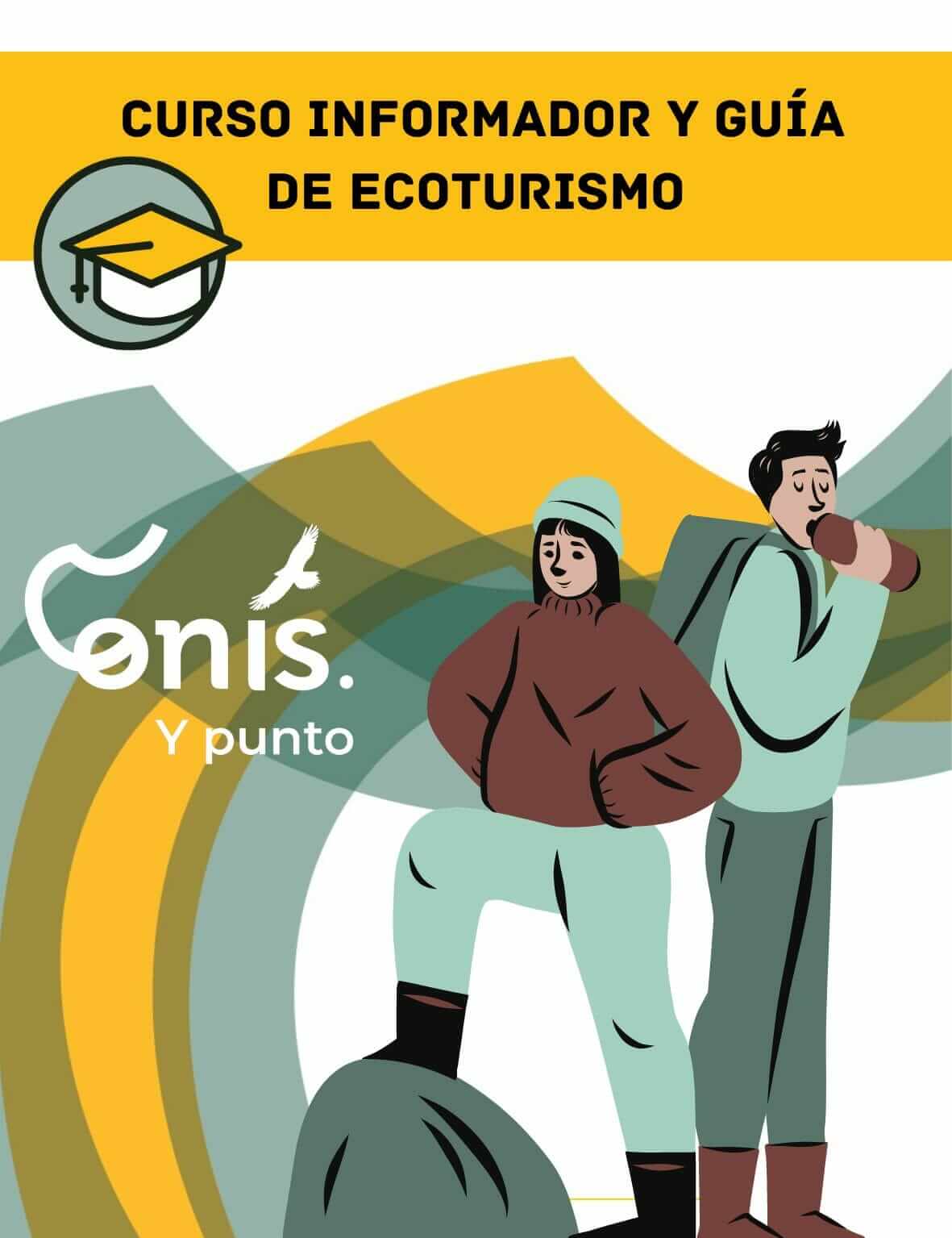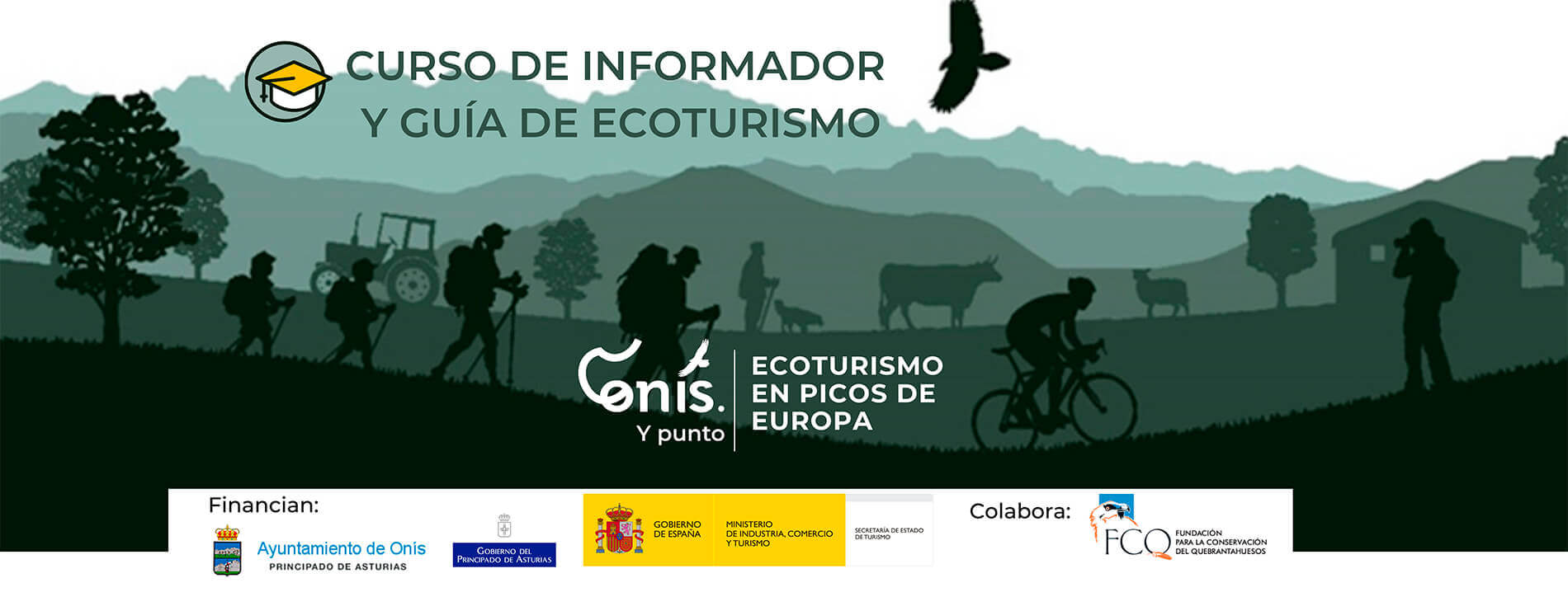Ecotourism Informant and Guide Course
Registration closed
Within the framework of the Tourism Sustainability Plan of Onís, this training action supports the implementation of the product ‘Ecotourism in Picos de Europa: Destino Onís’ (Ecotourism in Picos de Europa: Onís Destination).
OBJECTIVES
- To inform attendees about the ecotourism potential of the council of Onís, the trends of the tourism market and its regulation.
- To train attendees to carry out the task of providing tourist information on the tourist resources of Onís.
- To empower participants to plan, design and execute their own itineraries as an ecotourism guide.
- Training in professional aspects related to guided activities in the natural environment, such as orientation and first aid.
TARGET
- People of legal age, interested in developing their activity as guides or tourist informants.
- Priority will be given to people registered in and/or linked to the council of Onís.
- Previous training and/or work experience in the tourism sector will be an asset.
- Knowledge of English and other languages would be an asset.
FOR WHICH PROFILES DOES THE COURSE QUALIFY YOU?
To future professionals of the sector, who want to start in the services of assistance, information and accompaniment of tourists and visitors in the council of Onís, through two job profiles:
- The Tourist Informant is a person who works in the face-to-face and telematic attention of the Tourist Offices or Tourist Information Points, trained to inform and advise visitors about the resources, services and tourist activities of a given environment. It also undertakes tasks related to the promotion of the territory, the preparation and analysis of reports and visitor statistics, and the planning and execution of routes and activities related to local tourism resources.
- The Tourist Guide is responsible for guiding, accompanying and assisting a group of travelers in an itinerary, activity or tourist visit, planning, coordinating and managing all the services that will be offered to the client.
PLACE: Multipurpose Municipal Center (Benia de Onís).
DATES AND TIMES: February 28 to March 7, from 9:00 am to 5:00 pm.
DURATION: 50 hours
REGISTRATION: Through the Foundation for the Conservation of the Bearded Vulture. Enrollment in the course will be formalized by filling out the following form on-line form, email conchi@quebrantahuesos.org or Tf. 985 844 293
SELECTION CRITERIA: The link to the council of Onís and the level of previous knowledge and experience will be taken into account.
PRE-REGISTRATION DEADLINE: February 7 to 20, 2022
CONFIRMATION OF ADMISSION: February 22nd
CERTIFICATION: Students will receive a certificate of attendance, for which they must have attended at least 80% of the course hours.

Download course presentations
- Tourism market I: current trends in tourism supply and demand (Alfonso Polvorinos. The Ecotourist) Download
- Tourism market II: Ecotourist profile. Elements of an ecotourism product. Spain’s Sustainable Tourism Strategy 2030 ( Alfonso Polvorinos-El Ecoturista) Download
- Ecotourism in Asturias (Joaquín López- BIRDWATCHING ASTURIAS) Download
- Onís Tourism Sustainability Plan ( Clara Casanova, PSTD Onís Manager) Download
- Tasks of the tourist informer (Marisa Cabo. Director OT Llanes) Download
- Tourist Information Services ( Eusebio Barriga. Director Codevent) Download
- The World of Cider ( César Ruiz, El Cuchareru) Download
- Digital Marketing and Smart Tourism Destinations ( Vanina Posada-Internet Estratégico) Download
- Orientation and first aid(Ruben Cuesta Valpaís- Picos Outodoor) Download
Program
The contents have been structured in five modules with a total duration of 50 hours. The thematic blocks combine theoretical contents and practical sessions on the activities of tourist guides and informants. The course will be given by experts in the different topics and will include specific technical material.
Monday, February 28 (8 hours)
- 09:00-09:30h Reception of participants and delivery of documentation.
- 09:30-10:00h Inauguration and presentation of the course.
Module 1: Theoretical Framework of Ecotourism
- 10:00-11:00 h Tourism market: current trends in tourism supply and demand
- 11:00-11:300 h Coffee break.
- 11:30-13:00 h Ecotourism. Ecotourist profile. Elements of an ecotourism product. Spain’s Sustainable Tourism Strategy 2030
- 13:00-14:00 h Ecotourism in Asturias
- 14:00-14:30 h Picnic lunch
- 14:30-17:00 h Visit to tourist resources of the PSTO: Visit to Vega de Ario cheese factory and Quiliama cave and visit to the Museum of glacial fauna.
Tuesday, March 1 (9 hours)
Module 2: Tourist Resources of Onís.
- 9:00-10:00 Tourism Sustainability Plan for the council of Onís.
- 10:00-11.00h Running Circuits
- 11:00-11:30 h Coffee break.
- 11:30-14:00 h Visit to tourist resources of the PSTO: center of the Bearded Vulture Mountains and an orchard
- 14:00-14:30 h Picnic lunch
- 14:30-18:00 h Visit to other tourist resources of Onís: visits to Cueva Peruyal and Climbing routes (1/2 group)
Wednesday, March 2 (8 hours)
Module 3: Tourist Information Services.
- 9:00-10:00 h Marketing of ecotourism products: Fairs, agencies and tour operators. Web portals and reservation centers.
- 10:00-11:00 h Tasks of the tourist informant: visitor service, planning of tourist activities, promotion of the territory, collection and analysis of tourist data, preparation of reports.
- 11:00-11:30 h Coffee break.
- 11:30-14:00 h Practical session
- 14:00-14:30 h Picnic lunch
- 14:30-17:00 h Visit to the Tourist Information Office.
Thursday, March 3rd (8 hours)
Module 4: Tourist Guide and Interpretation Services.
- 9:00-11:00 h Interpretation of the tourist resource. Communication and Group Dynamization Techniques (Part 1)
- 11:00-11:30 h Coffee break.
- 11:30-14:00 h Practical session: itineraries, guided tours and other services.
- 14:00-14:30 h Picnic lunch
- 14:30-17:00 h Visit to tourist resources of the PSTO: hiking trails, bicycle routes.
Friday, March 4 (9 hours)
Module 4: Tourist Guide and Interpretation Services.
- 9:00-11:00 h Interpretation of the tourist resource. Communication and Group Dynamization Techniques (Part 2)
- 11:00-11:30 h Coffee break.
- 11:30-14:00 h Practical session: itinerary (Güeña river route), guided tours and other services.
- 14:00-14:30 h Picnic lunch
- 14:30-18:00 h Visit to tourist resources of the PSTO: Cueva la Peruyal and climbing routes ( ½ group)
Monday, March 7 (8 hours)
Module 5: Smart Tourist Destinations.
- 9:00-11:00 h New trends for tourism promotion: mobile Apps, geo-referencing, virtual and augmented reality. Recommendation portals
- 11:00-11:30 h Coffee break.
- 11:30-14:00 h Market segmentation: big and small data. Emotional marketing, loyalty
- 14:00-14:30 h Picnic lunch
- 14:30-16:00 h Orientation and First Aid
- 16:00-17:00 h. Evaluation and Closing of the course; presentation of diplomas
SKILLS ACQUIRED BY STUDENTS AFTER THE COURSE
It is intended that at the end of the course the students will be able to:
- To know the main characteristics of the tourism markets of Asturias, especially in relation to nature tourism and ecotourism.
- To know in depth the touristic resources of Onís and its potentialities
- Develop inventories, contents and promotions of local tourism resources.
- To offer a professionalized tourist information and assistance service, in person, by telephone and on-line.
- Adapt the information on Onís’ tourist resources and services according to the visitor’s profile: family, sportsmen, school children, naturalists, senior citizens, etc.
- Design and execute itineraries and guided tours around the tourist resources of Onís.
- Communicate in an efficient and effective way with users, tourism professionals, administrations involved, etc.
- To know and manage the tools of Smart Tourism Destinations.
- Proper management of suggestions, complaints and claims.
- Learn how to resolve last minute incidents and setbacks in the development of your guiding duties.
- Collect and process information provided by users/tourists regarding their experience.

